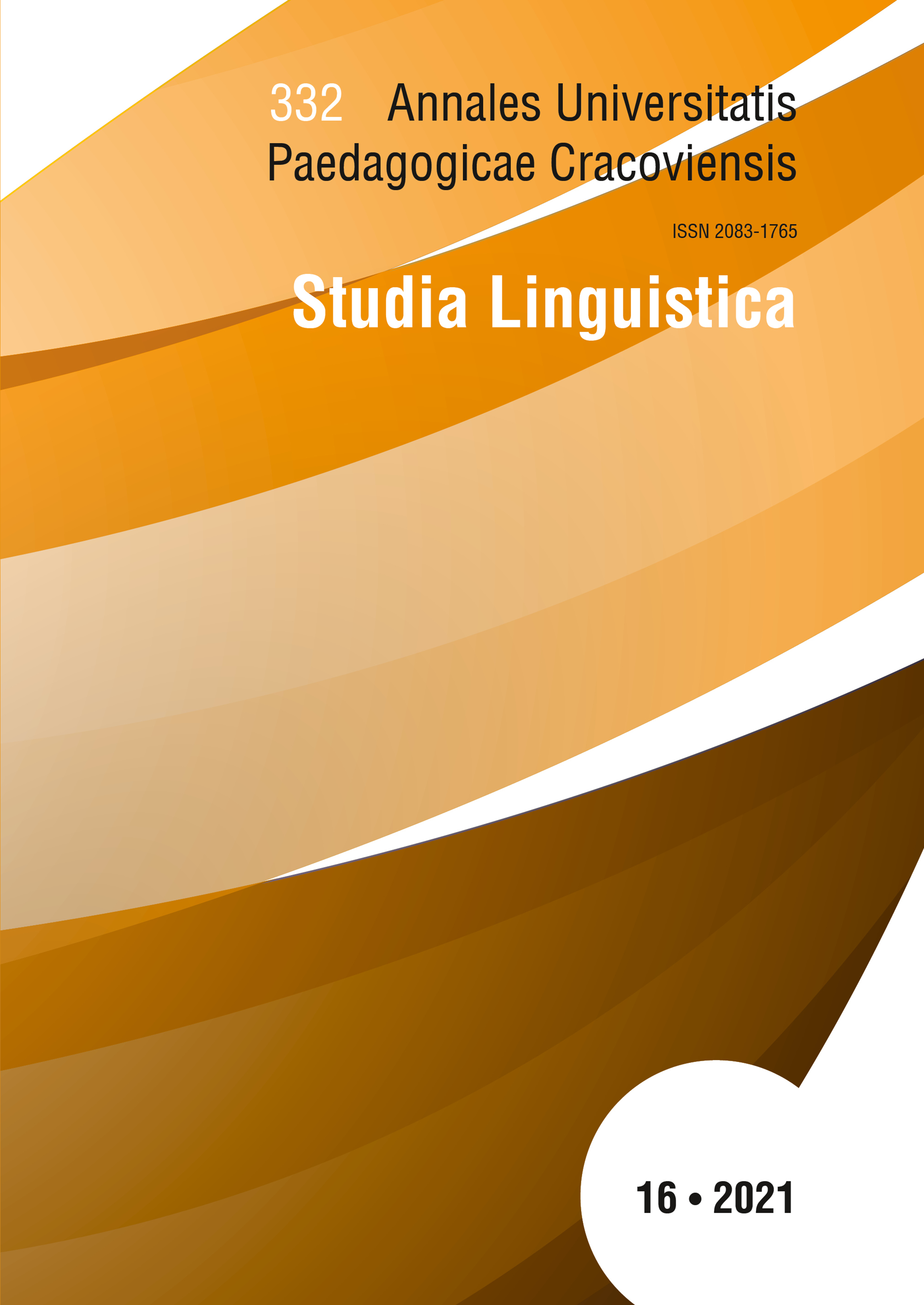The rhetoric of flirtation on the basis of M. Mitchell’s novel: Gone with the wind. Case study
Main Article Content
Abstract
There are many shades of the phenomenon of flirtation. We may speak about coquetry in literature, movies or advertisements. We may analyse both verbal and non-verbal aspects of the phenomenon in question in various periods, places and social groups. The main aim of the paper is to discuss only one “shade” of flirtation, namely conversations held by Scarlett O’Hara and Rhett Butler from M. Mitchell’s novel Gone with the wind from the rhetoric point of view.
Downloads
Article Details

This work is licensed under a Creative Commons Attribution-NonCommercial-NoDerivatives 4.0 International License.
Author, submitting a text to the editorial board of the journal “Annales Universitatis Paedagogicae Cracoviensis. Studia Linguistica", certifies that the content of the article has not been published so far and that the work does not violate in any way the copyright or related rights of other person, as well as other rights of third parties, and that no one's rights to the work (or any part thereof) have been missed. After signing the contract, the property rights to the published materials are transferred to the Scientific Publisher of the University of the National Education Commission, Krakow.
“Annales Universitatis Paedagogicae Cracoviensis. Studia Linguistica” is an open access journal, and all its content is made available free of charge to users and institutions under the Creative Commons CC-BY-NC-ND 4.0 license (attribution, non-commercial use, no derivative works). Under this license, the authors agree that their work may be lawfully reused for any purpose, except for commercial purposes, without the prior consent of the author or publisher. Everyone can read, download, copy, print, distribute and process these works, provided that the author's marking and the original publication place are correct. Published texts may not be used to create derivative works (e.g. to translate and publish in another language without the consent of the publisher). This is in line with the BOAI (Budapest Open Access Initiative) definition. "Studia Linguistica" does not charge for submitting or processing articles.
References
Bańko M., Zygmunt A., 2010, Czułe słówka. Słownik afektonimów, Warszawa.
Google Scholar
Bańkowski A., 2000, Etymologiczny słownik języka polskiego, t. 1, Warszawa.
Google Scholar
Benbow T., Simpson J., Weiner E., 1984–1989, The Oxford English Dictionary, Oxford.
Google Scholar
Bralczyk J., Kirwil L., Oponowicz K., 2018, Pokochawszy. O miłości w języku, Warszawa.
Google Scholar
Brückner A., 2000, Słownik etymologiczny języka polskiego, Warszawa.
Google Scholar
Długosz-Kurczabowa K., 2003, Nowy słownik etymologiczny języka polskiego, Warszawa.
Google Scholar
Doroszewski W. (red.), 1960, Słownik języka polskiego, t. 2, Warszawa.
Google Scholar
Fleming P., 2015, The art of flirtation: Simmel’s coquetry without end, [w:] Flirtations, red. D. Hoffman-Schwartz, B.N. Nagel, L.S. Stone, New York, s. 19–30.
Google Scholar
Freud S., [1915] 1981, Thoughts for the times on war and death, [w:] The standard edition of the complete psychological works of Sigmunt Freud, przeł. J. Starchey, London, s. 275–301.
Google Scholar
Grząśko A., Kiełtyka R., 2021, Verbal duel and flirtation from a cognitive perspective: A case study of film noir “The big sleep” (1946), „Lege artis. Language yesterday, today, tomorrow. The journal of University of SS Cyril and Methodius in Trnava” VI (1), s. 2–39.
Google Scholar
Hoffman-Schwartz D., Nagel B.N, Stone L.S. (red.), 2015, Flirtations, New York.
Google Scholar
Kalinowska K., 2018, Praktyki flirtu i podrywu. Studium z mikrosocjologii emocji, Toruń.
Google Scholar
Karłowicz J., Kryński A., Niedźwiedzki W. (red.), 1900–1927, Słownik języka polskiego, t. 1, Warszawa.
Google Scholar
Kita M., 2007, Szeptem albo wcale. O wyznawaniu miłości, Katowice.
Google Scholar
Kita M., 2013, Polski dyskurs prywatności, „Postscriptum Polonistyczne” 11, s. 93–103.
Google Scholar
Korolko M., 1990, Sztuka retoryki, Warszawa.
Google Scholar
McCaig D., 2008, Rhett Butler, przeł. A. Kołyszko, Warszawa.
Google Scholar
Mitchell M., [1936] 2008, Przeminęło z wiatrem, przeł. C. Wieniewska, Warszawa.
Google Scholar
Olekszyk J., 2005, O języku flirtu prawie wszystko, Warszawa.
Google Scholar
Pacuła J., 2020, Z historii polskiego słownictwa erotycznego – nazwy intymnych części ciała w dawnym socjolekcie przestępczym, „Annales Universitatis Paedagogicae Cracoviensis Studia Linguistica” 15, s. 163–178.
Google Scholar
Platon, [c. 385–370 p.n.e.] 1975, Uczta, przeł. W. Witwicki, Warszawa.
Google Scholar
Ripley A., [1991] 1992, Scarlett, tłum. K. Molek, Warszawa.
Google Scholar
Simmel G., [1909] 1984, On flirtation, [w:] Georg Simmel, on women, sexuality, and love, red. G. Oakes, New Haven, CT, s. 133–152.
Google Scholar
Simmel G., [1911] 1949, The sociology of sociability, „American Journal of Sociology” 55 (3), s. 254–261.
Google Scholar
Sławski F., 1983, Słownik etymologiczny języka polskiego, Warszawa.
Google Scholar
Tannen D., 2002, To nie tak, Poznań.
Google Scholar
Umińska-Tytoń E., 2011, Polszczyzna dziewiętnastowiecznych salonów, Łódź.
Google Scholar
Wittgenstein L., 1972, Dociekania filozoficzne, Warszawa.
Google Scholar
Wojciechowska A., 2017, Afektonimy jako przedmiot badań lingwistycznych (na materiale listów Wojciecha Kossaka do żony, „Stylistyka” XXVI, red. E. Malinowska, s. 291–304.
Google Scholar
Wyspiański S., [1901] 1990, Wesele, Warszawa.
Google Scholar
ENCENC. Encyklopedie humanistyczne, hasło: adagium, https://encenc.pl/adagium (dostęp: 19.07.2021).
Google Scholar
Nordquist R., 2018, Figures of Speech: Epiplexis (Rhetoric), ThoughtCo., https://www.thoughtco.com/epiplexis-rhetoric-term-1690664 (dostęp: 10.02.2021).
Google Scholar
Nordquist R., 2020, Hypophora (Rhetoric), ThoughtCo., https://www.thoughtco.com/hypophora-rhetoric-term-1690947 (dostęp: 10.02.2021).
Google Scholar
Skarbnica figur retorycznych, hasło: adagium, https://figury.net.pl/slownik/adagium (dostęp: 24.02.2021).
Google Scholar
